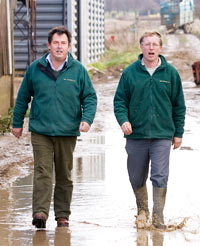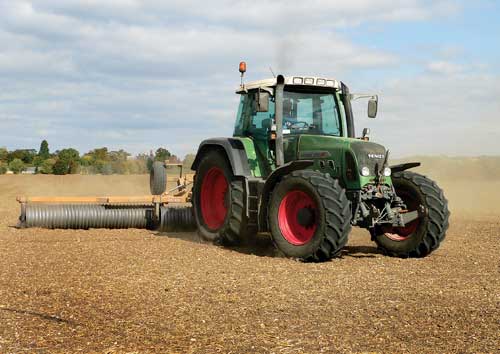Machinery fleet ready for spring work at HBH Farming

Heavy rain has held up establishing spring crops at our Management Matters farm in central England. Nick Fone finds out more
With more than 550ha (1360 acres) of spring crops to get in the ground, the team at joint venture farming company HBH, in Oxfordshire, has its work cut out.
Like so much of the UK, the region has had more than its fair share of rainfall in the first two months of 2010, making cultivation and drilling operations impossible.
“Across the 14 holdings we look after, we’ve got 40ha of wheat to get in, 150ha of barley, 180ha of beans and more than 180ha of poppies to drill,” says partner Guy Hildred. “Watching the rain come down day after day doesn’t fill me with confidence but we’ll get it done eventually.”
With temperatures slowly on the rise and spring steadily creeping in, the company’s two Amazone fertiliser spreaders are ready to get going the minute the ground dries out enough to let them travel. But following a trial with compost for the last few years, the workload isn’t quite as hefty as before.
“We’re paying about £1/t for compost and putting it on at about 8-10t/acre,” says HBH partner Ed Bishop. “Seeing the effect that it had in previous years, we didn’t spread any manufactured nitrogen on our rape last autumn and won’t again this year – we probably won’t need to bother with sulphur either.”
More than three-quarters of HBH’s oilseed rape was established last year using a broadcaster on the back of the company’s 3.8m Simba Solo. That has had a big impact on establishment costs.
“On our home farm we used to plough everything regardless,” says Mr Bishop. “What it was costing to do the job never came into question – we knew it worked and we got a crop every time. But since we’ve set up HBH, it’s really focused the mind and, because we’re spreading our costs across nearly 8000 acres, we can justify a much broader range of kit to suit different situations.
“Using the Solo to establish the rape knocks out a drill pass, which is probably costing us £15-20/acre. But it is then critical to get the seedbed consolidated. Everything is rolled twice – we’ve seen huge differences in establishment and slug damage where ground has only had the rolls over it once – it’s a cheap luxury.”
Each of the three major partners’ businesses is charged a contract fee by HBH. Machinery and men are managed by the company with Mr Hildred and Mr Bishop making day-to-day decisions.
“We keep a close eye on costs but not at the expense of doing the job properly,” says Mr Hildred. “Of course we’re always looking to trim our outgoings for the benefit of client businesses but HBH is not about generating monster profits – it was set up to spread costs and provide a hassle-free service for our clients and ourselves.”
Farm Facts: HBH (Farming) LTD Oxfordshire, Berkshire,Hampshire |
|---|
Because of the nature of the setup, one of HBH’s biggest outlays is machinery. Depreciation alone totals £128,000 a year but spread across 3240ha (8000 acres) the figure is a much less daunting £39.50/ha (£16/acre).
Putting all that cost on to the contract business means clients’ books look a lot healthier. For example, Mr Hildred’s 800ha (2000-acre) farm last year had an annual depreciation figure of just £18,000, mainly attributed to vehicles, buildings and static plant like grain driers.
“With just four tractors we like to think we run a pretty tight ship,” says Mr Bishop. “They are bought on hire-purchase agreements and we go for the complete service package which means we know exactly what they will cost to run over the four years.”
It’s a headache-free arrangement that allows the partners to concentrate on their core activities of crop and stock management. If a machine breaks down they know they will have a replacement within 24 hours. “We don’t like surprises – we like to know everything will work as it should. Life is for living, not worrying about what will go wrong next.
“Our guys rarely pick up a spanner,” says Mr Bishop. “Their expertise is in operating the machines and getting the most out of them. Messing about in the workshop doesn’t earn us a penny.”
As part of HBH’s regular four-year replacement policy, this year it is the lightweight fertiliser spreading, corn-carting and ploughing tractor that is up for change. The 180hp Fendt 818 Vario is to be superceded by a 215hp Massey Ferguson 6499.
“We stick with Agco tractors and Claas combines because we get such good service from our dealers, Lister-Wilder and Southern Harvesters,” says Mr Hildred. “We rely incredibly heavily on them for back-up and I believe it is important to show some loyalty so that, as good customers, we will be well looked after.”
In addition, both partners recognise the importance of providing staff with machinery they are happy and comfortable in. So, although other makes are considered, changes are a rare occurrence. So why switch from Fendt to Massey this time around?
“The dealer had a stock tractor sitting in his yard that he offered us an incredibly good deal on and there don’t seem to be the differences there once were between Fendt and MF so justifying the price premium is difficult.
“The 818 will stay with us until after harvest, taking the total tractor count to five, which is still pretty lean across 8000 acres I think.”
Both partners wonder if having two Claas Lexion 600s might seem a little bit overkill to cover the 2400ha (6000 acres) of arable ground. But it is a luxury they have been glad of given the tricky conditions of the last three harvests.
“Having the two 600s buys us that bit of security and we’ll still cut our milling wheats at more than 20% moisture,” reasons Mr Bishop. “With a £30/t premium for quality, it’s worth getting it at the right time and drying it down.”
Still, the hope is that this year will come good and the spread of soil types across the various farms will allow for a smooth, steady and, most importantly, dry harvest.
Winter wheat margins |
|
|---|---|
| Variable costs | £296.50/ha (£120/acre) |
| Rent | £247/ha (£100/acre) |
| Cultivations | £247/ha (£100/acre) |
| Total cost | £790.70/ha (£320/acre) |
| Crop £667/ha | (£270/acre) 3t/acre @ £90/t |
| SPS £173/ha | (£70/acre) |
| Total revenue | £840/ha (£340/acre) |
| Margin | £49.40/ha (£20/acre) |
| NB – Costs do not include an allowance for management time. |
 |
|---|
| HBH’s prime top work tractor – a four-year-old 180hp Fendt 818 – will be replaced this year by a 215hp MF 6499. |
HBH farming fleet |
|---|
Tractors
Combines Loaders Sprayers Spreaders Drills Cultivators |
